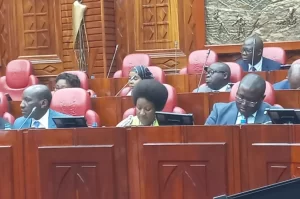PCE Innovative Plans To Curb Exam Cheating
PCE Innovative Plans To Curb Exam Cheating. To stop students from cheating on exams, the Parliamentary Committee on Education (PCE) plans to make significant reforms.

Many education stakeholders are eager to put an end to the vice of exam cheating, therefore the dramatic changes will likely have an impact on the Kenya National Examinations Council (KNEC).
Nabii Nabwera, a committee member, claims that the examination body is the focus of attention as the committee travels the nation to hear the public’s opinions on the issue.
Cheating, according to the Lugari Member of Parliament, has lowered trust in regional organizations. Both the local graduates and their appearance when seeking additional education abroad are impacted.
At the Mama Grace Onyango social hall in Kisumu, the MP was addressing members of the public when he revealed that some local private universities have even decided to require local Form Four graduates to take bridging courses before they are admitted because they have lost credibility as a result of cheating.
The rating of educational institutions while releasing national examinations would be permanently deleted, according to Nabwera.
He claims that because of unorthodox competitions brought on by school rankings, parents, professors, and even students have turned to unconventional means of obtaining high scores.
He continued by saying that the pattern has even resulted in the addition of illicit expenses known as “motivation fees for external speakers.”
He cited the information that revealed that in one institution, more than three-quarters of KCSE (Kenya Certificate of Secondary Education) pupils received an A.
Cheating is an issue in primary schools, according to Elly Ondiek, chair of the Kisumu County branch of the Kenya Primary School Heads Association (KEPSHA).
Ondiek claims that KNEC employees are primarily to blame for cheating on national exams.
He stated that in order to combat the vice, more severe measures, such as lengthy prison terms, must be put in place.
Goerge Opiyo, a colleague from the secondary school, claimed that cheating has changed, with offenders now employing technology to further their nefarious goals of exam fraud.
He argued that “the government should penetrate the network and permanently destroy it.”
He disclosed that examiners who uncover instances of fraud are demonized and abandoned.
According to David Obuon, chair of the Kenya National Union of Teachers’ (KNUT) Kisumu City branch, tying teacher promotions to students’ achievement on national exams also encourages exam cheating.
He continued by saying that instructors and school administrators will do whatever to make sure children receive excellent scores.
He suggested that teachers be promoted in accordance with their academic credentials.
The committee also includes Dr. Christine Ombaka and Peter Orero.
